Six University of Georgia faculty received a First-Year Odyssey Teaching Award in 2023 in recognition of their success as innovative teachers in the First-Year Odyssey Seminar program. They were recognized on February 22 at the FYOS Program Appreciation Breakfast and Teaching Awards Ceremony.
The FYO Teaching Award recognizes outstanding instructors who have demonstrated creativity or innovation in instruction, connection to the instructor’s research and incorporation of FYOS program goals into the seminar. This year’s recipients have been fully engaged with their students and have provided them with a strong connection to the university.
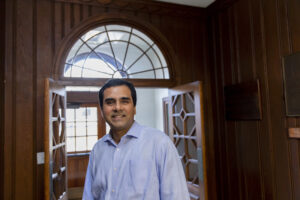
Puneet Dwivedi
Puneet Dwivedi, associate professor in sustainability sciences with the Warnell School of Forestry and Natural Resources, encourages his students to think critically about their environmental impact in his First-Year Odyssey Seminar, “Exploring Sustainable Development.” As students learn about sustainable practices, Dwivedi organizes field trips to the Lilly Branch Watershed and the UGA Steam Plant to teach students about sustainable energy production and consumption. He also introduces his students to resources on campus, such as the McBay Science Library, MakerSpace and the Web of Science Database, which students can use throughout their college careers. One of Dwivedi’s assignments involves using MakerSpace’s 3D printing technology to give students hands-on experience with this resource. The main goal of Dwivedi’s seminar is to teach students how to connect their classwork to real-world situations and express themselves about the issues most important to them.
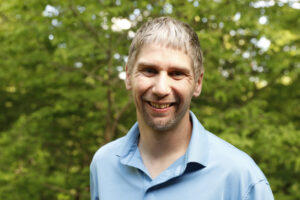
Michel Kohl
Students in Michel Kohl’s seminar, “Cameras, Collars, and Counts: How We Monitor Georgia’s Wildlife,” learn about wildlife biology in the best way possible – spending time in the wild. Kohl, assistant professor of wildlife management and wildlife extension specialist with the Warnell School of Forestry and Natural Resources, leads his seminar on a two-day camping trip to Vogel State Park in North Georgia. While hiking around the park, Kohl’s class learns how wildlife ecologists monitor animal behavior and movements with GPS collars and game cameras, and they learn about tracking wildlife using Very High Frequency antennas with a hands-on competition. The camping trip also allows Kohl to connect with his students in an informal setting to discuss academics and research at the university while forming relationships that will last beyond the end of the semester.
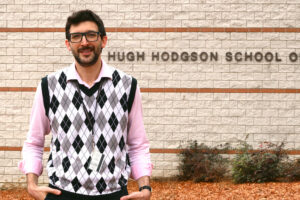
Dickie Lee
Dickie Lee, assistant professor of music theory in the Hugh Hodgson School of Music, introduces students to the “Classic City” of Athens in his seminar, “The Music of Athens, GA.” Lee’s students learn music theory and terminology as they tour local music venues and explore Athens’s music history through learning opportunities like the “Georgia on My Mind” exhibit at the Special Collections Library. Lee provides his students with a “choose your own adventure” style of grading, so students have options for how they immerse themselves in the music of Athens. Students are encouraged to attend and review live music shows, participate in online discussions about music assignments, and even connect with and interview a local artist. Lee’s students are given active learning opportunities to get out of the classroom and connect with the city they will call home for the next few years. Lee teaches in the Franklin College of Arts and Sciences.
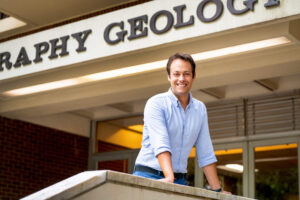
Mattia Pistone
Students in Mattia Pistone’s First-Year Odyssey Seminar, “MAGMA MIA! Understanding Active Volcanoes with Modern Petrology,” are inspired to become the next generation of “Earth’s health-care professionals.” Pistone, assistant professor in petrology and volcanology with the Department of Geology in the Franklin College of Arts and Sciences, connects his students to our planet by teaching the importance of studying the Earth’s interior. By dissecting ancient volcanoes and investigating current volcanic activity, students learn how scientists can assess Earth’s geological past as well as forecast future geological processes that may affect the planet. As students study volcanic eruptions throughout history and explore real-world scenarios through hands-on laboratory activities, Pistone teaches them about the process of conducting research, from forming their hypothesis to creating computational models of scenarios – skills his students will use throughout their university experience.
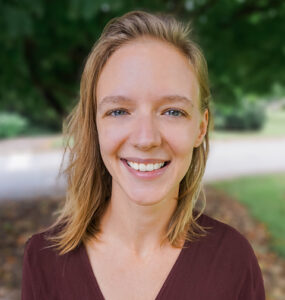 Michelle Ritchie
Michelle Ritchie
Michelle Ritchie, assistant professor with the institute for Disaster Management, Health Policy & Management, designed her seminar, “A Field Guide to Resilience,” as an experiential learning companion to the book, Braiding Sweetgrass. This book, written by Professor Robin Wall Kimmerer who is a member of the Citizen Potowatomi Nation, blends scientific and Indigenous knowledge to reflect on the relationship between humans and the non-human world. Ritchie and her students engage in class discussions about Braiding Sweetgrass and connect with the natural world through trips to UGArden, the Founders Memorial Garden, and other field days outside the classroom. Throughout the seminar, Ritchie’s students evaluate their own resilience, explore their relationship with nature and learn how to best communicate and form dialogues with their peers and faculty at UGA. Ritchie teaches in the College of Public Health.
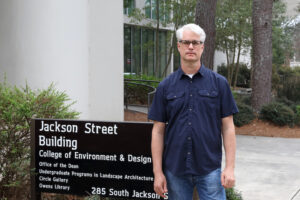
David Spooner
Students in David Spooner’s seminar, “The Experience of Place,” learn what makes the difference between the landscapes, buildings, and rooms they enjoy versus the spaces that are so uninspiring they cannot wait to leave. Spooner’s seminar teaches students how minor design choices can dramatically change how a place is experienced and how they can apply design theory to their everyday lives. Spooner’s students learn by examining the buildings, structures, and facades around campus; engaging in discussions and critiques of their design drawings; and researching how “good” design serves the public good. By the end of the seminar, students are able to think critically to recognize and define why they feel an emotional connection to a place. Spooner is an associate professor in the College of Environment and Design.
